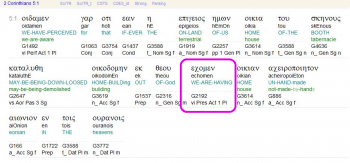So, you make my point for me . . . we shouldn't go looking at the Hebrew wording and grammar in the OT to bring clarity to the Greek grammar in the NT.@marks what is being translated as "with" by 101G is best understood to be as "an Entity" where God is referring to himself and the verse would be better understood if it was translated in this manner: -
Isaiah 41:4: -
Who has performed and accomplished it,
Calling forth the generations/ages from the beginning?
'I, the Lord, am the first, {and} with the last/last entity. I am He.'"
This is the Hebrew interlinear I use from PC Study Bible: -
View attachment 13321
and for me the LXX interlinear that you copied does not seem to express the same message context as shown above.
H:0853 has the understanding of an entity, i.e. in this case "God," and is considered to not be translatable from the Hebrew into the English language.
View attachment 13322
Just as we should be cautious with the English Translation scholars, we also should be cautious with the Israelite Greek translators.
It is my view that the LXX does not convey the same message content as is found in the Hebrew source text.
Following the Grammar, although important, can also lead us astray if we do not understand the limitations of the particular source scriptures that we use.
Shalom
Apples and oranges!
Much love!


